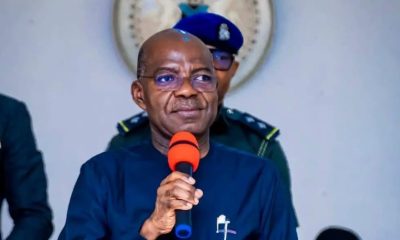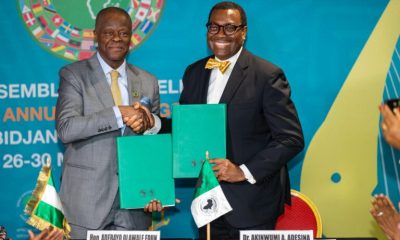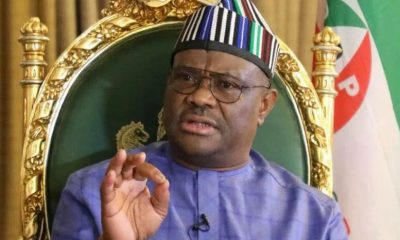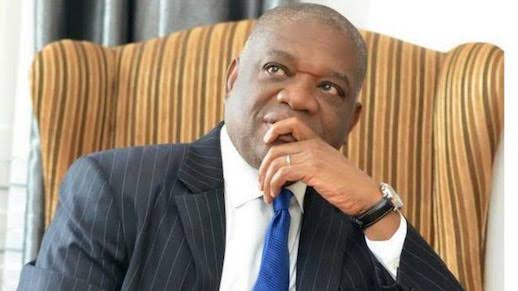Uncategorized
When the Bell Tolls on Nigerian Economy
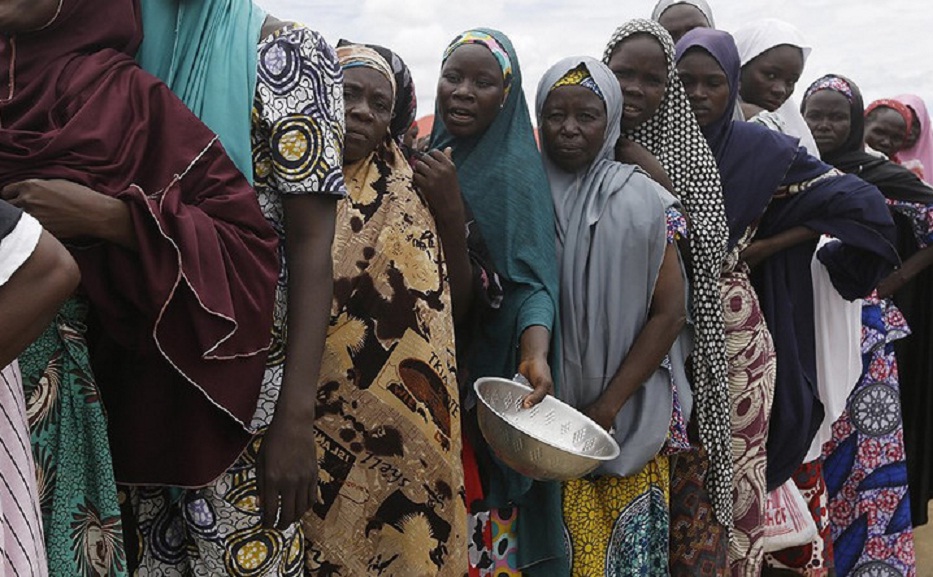
By Mahmud Mustapha
In the past few weeks, alarm bells have been ringing about the danger facing the Nigerian economy. These alarm bells cannot be said to be frivolous or borne out of partisan inclinations because they are coming from tested economists and those who know about how well-run economies look like.
The most recent is by the Emir of Kano, Lamido Sanusi Lamido, a renowned banker who rose to become Governor of the Central Bank of Nigeria.
Speaking at a Workshop on National Treasury in Abuja, the traditional ruler and economist unequivocally said that the country was heading towards bankruptcy if the Buhari administration failed to stop fuel and electricity subsidy.In the same vein, the respected Invest Africa magazine has also drawn attention to Sanusi’s warning about Nigeria’s imminent bankruptcy, even when some people said he had denied the statement. Sanusi is not the type of man who denies statements credited to him. Even if he denied it, it should be noted that these concerns are no fluke as the high level of borrowing and debt servicing embarked upon by the Buhari administration should be a source of great worry about the future and health of the nations’ economy in any place where a genuine democracy is in place. The fact that Buhari’s pseudo-democratic government has conquered other organs of government which should normally be independent as provided by the constitution, gives cause for deep concern.
The way things stand now in Nigeria, a silent fear has gripped majority of Nigerian intellectuals, technocrats and political leaders that they might come under the hidden monitoring camera of the regime if they dare say the truth about the Nigerian condition.
The economic condition of the majority of Nigerians is currently very bad. Statistics from reputable foreign economic monitoring bodies like the Austria-based World Poverty Clock has it that a whopping 93.8 million Nigerians, as at June 2019, suffer from extreme poverty and that about six Nigerians fall into damning poverty every six minutes. On its own part, the National Bureau of Statistics (NBS) puts the country’s unemployment rate at 23.1 per cent, under employment at 20.21 per cent and youth unemployment at 55.4 per cent.
The above indices show that many Nigerians notably the young and educated population is battling with poverty. It was not long that Nigeria became the laughing stock of the World when in 2018, the World Bank and other multilateral institutions declared the country as the World poverty capital thus sounding another alarm bell for Nigeria’s political leaders.
It should be stated that these poverty indices became prevalent under the administration of President Buhari who took more than six months to put a cabinet in place after he emerged victorious in the 2015 elections. President Buhari’s lack of foresight and passable knowledge of economic issues, in the view of many experts and observers was the main reason for the recession that hit Nigeria in 2016, the first time since independence that the nation’s economy would be in such a mess. Granted that the excesses of the Goodluck Jonathan administration contributed to the economic difficulties the country faced after Buhari took over in 2015, the poor policy choices and outright lack of choice under Buhari’s watch, made economic recession and creeping poverty inevitable.
It was in this condition of recession hangover, continuing corruption in the government and the continuing burden of fuel subsidy that the 2019 polls came. Faced with enormous hardship under Buhari, the majority of the Nigerian people reasoned that voting out the lackluster administration of President Buhari was the way to put a stop to the relentless march of poverty and social dislocation in the country.
The APC and Buhari claimed victory in that election against the postulation of many analysts before the polls. The management of the Independent National Electoral Commission (INEC) whose uncertain and indecisive public posture on issues arising from the collation of results at the Presidential Election Tribunal also sided with Buhari and his party’s’ claim. However the INEC’s shifty position on the Server issue has convinced many Nigerians that much still needs to be straightened out about the conduct of that election and the declaration of a winner. The final report of European Union election monitors on the conduct and outcome and the nationwide violence that attended the election proper, points to the fact that the opposition Peoples Democratic Party (PDP), and its presidential candidate, Atiku Abubakar have a strong and genuine case before the Judiciary. It is the view of many Nigerians that Atiku Abubakar, who promised to make Nigeria work again by providing millions of jobs and providing an enabling environment for entrepreneurship to blossom won the 2019 polls and that the judiciary has a duty to tell the world so!
The issue is that having used widespread violence and the coercive instruments of the state to hijack the 2019 election outcome, it is now a task for the nation’s judiciary, to show that it is modern, fearless and independent to reverse the outcome of that election. The judiciary owes this duty to Nigerians not only for the sake of restoring the hope of Nigerians in democracy but rescuing the nation’s economy from the hands of a man who clearly does not know how a modern economy should be run.
The poor economic history of Nigeria under Buhari’s watch, characterized by growing poverty of the population, is the result of poor leadership. President Buhari clearly lacks the knowledge, temperament and leadership to guide a team that can make an economy flourish and the people enjoy a good life.
It was for this reason that when Buhari told Nigerians at the 2019 Democracy Day celebrations that his All Progressives Party (APC) administration can raise 100 million Nigerians from poverty in a period of ten years, those who have observed him since 2015, labelled the statement as hollow. Most Nigerians hold the view that the Buhari persona, his leadership style and his pervasive nepotism and policy of exclusion, means that the president and his party, the APC can only descend people into poverty, not to lift them.
Among the reasons why the growing poverty in Nigeria persists, and might continue despite Buhari’s good intentions are first, the poor and indecisive leadership of Buhari. Second, is the nationwide security problem, violence and killings which has dislocated many Nigerians. Third, is the problem which herdsmen pose to the farming population in the country that has uprooted millions of farmers from their farmlands mostly in the Northern part of the country. Food shortages are more than likely all through Buhari’s four year tenure till 2023, if the judiciary does not rescue the nation from his vice grip by declaring the rightful winner of the 2019 elections. President Buhari has shown that he lacks the will to deal with the problem of insecurity, more so when his military commanders blame everyone except themselves for the security problems in the country including Boko Haram insurgency in the North east region of the country. The insecurity issue has emerged as a disincentive to domestic and foreign investment. Four, the country’s huge population is another factor. With a population today, at 200 million and projected to rise to 400 million around 2050, the nation will be in a messy situation if it does not solve its leadership, social, infrastructural, educational and health delivery problems which are becoming critical by the day. President Buhari is not the type of man to put in place and implement a credible and effective population policy to help ensure that the country can manage its population.
Part of the solution to the poverty problem is the practice of true federalism under which the Federal Government, the States and local government will be responsible partners with each level of government working hard to eradicate poverty among the people under its care. Unfortunately, President Buhari does not believe in true Federalism compared to the opposition candidate in the 2019 polls, Atiku Abubakar who is a disciple of Federalism and who has taken pains to lay out the ways and means of its implementation to free the creative and productive energies of the constituent parts of the country.
Finally, Nigeria according to commentators and agencies who are conversant with the Nigerian economy, is in dire straits. The onus is on all Nigerians with the influence to right the wrongs to ensure that the nation is placed in credible hands.
*Mahmoud Mustapha, a public affairs analyst, wrote from Bauchi.
Uncategorized
Tinubu Repositioning Nigeria for Sustainable Growth – Gov. Yahaya
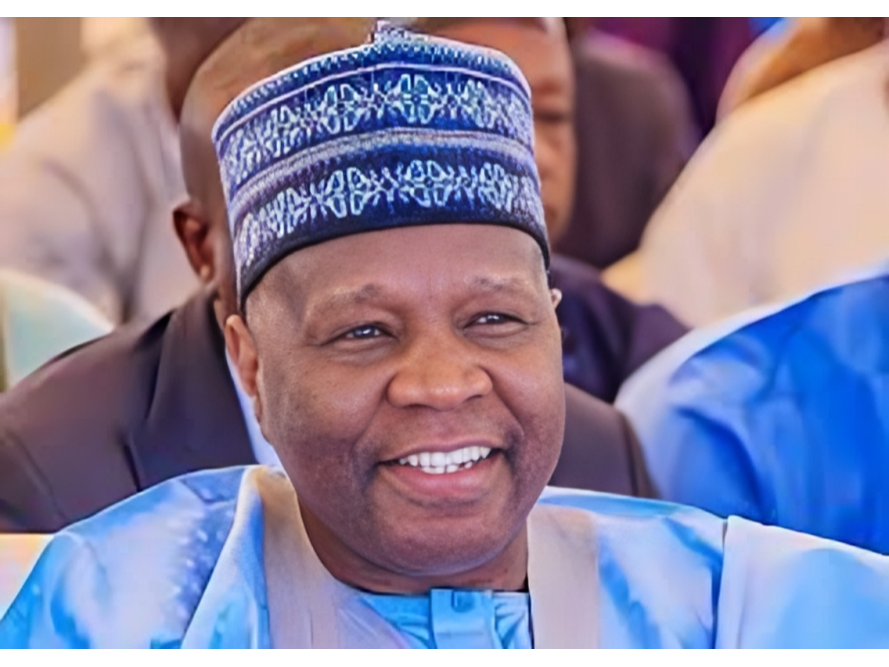
Gov. Yahaya of Gombe State has lauded President Bola Tinubu for the implementation of viable social and economic reforms geared towards repositioning Nigeria for sustainable development.
The governor felicitated with the President and his deputy, Vice President Kashim Shettima on the occasion of their second anniversary in office.
Yahaya, in a goodwill message by his media aide, Mr Ismaila Uba-Misilli, said Tinubu’s bold reforms would reposition Nigeria on the path of sustainable growth.
He described Tinubu’s two years in office as those of courage, bold reforms, and purposeful governance under its Renewed Hope Agenda.
“President Tinubu has taken decisive steps to reposition Nigeria on the path of sustainable growth,” he said.
Yahaya said that Tinubu had initiated viable infrastructure development projects such as the Lagos – Calabar Coastal Highway and the Sokoto-Badagry Road, as landmark efforts to bridge developmental gaps and stimulate the economy.
According to Yahaya, these projects, along with other strategic interventions in energy, agriculture, transportation, and the digital economy, are gradually laying the foundation for a more prosperous and resilient Nigeria.
He acknowledged Tinubu administration’s renewed drive to tackle security challenges, describing the intensified campaign against insurgency, banditry and criminality as “commendable.”
Yahaya, who is also the Chairman, Northern Governors’ Forum (NGF), also applauded the president’s inclusive and consultative leadership style, fostering national unity and renewed confidence in governance.
“The Northern region is already feeling the ripple effects of Tinubu’s policies through the improved Federal Government collaborations, increased access to social investments, and targeted empowerment programmes for youths, women and vulnerable groups.”
He further prayed for continued divine guidance, good health and greater wisdom for Tinubu as he steers the nation toward peace, equity and development. (NAN)
Uncategorized
Zulum Clears N4.5bn Workers’ Gratuity in 1 year

Gov. Babagana Zulum of Borno has paid the gratuity and other entitlement of civil servants amounting to N4.5 billion in one year.
The spokesperson of the governor, Mr Dauda Iliya, made this known in an interview in Maiduguri, on Zulum’s achievements from 2024 to date.
Iliya said that Zulum’s administration also cleared all outstanding gratuity and other entitlements of retired Permanent Secretaries up to December, 2024.
He said that the accrued outstanding gratuity and other entitlements of the senior civil servants cleared in December was put at N1.49 billion.
The spokesperson said that was in addition to the N200 million being paid monthly by the state government to the teeming retirees.
“The governor has pledged to settle all outstanding pensions and gratuities of civil servants before the end of his tenure,” Iliya said.
The spokesperson said that Zulum’s administration was committed to settling all backlog of pensions and gratuities owed civil servants in the state before the end of its tenure.
“In the area of post-conflict recovery effort, Zulum’s administration has, in collaboration with the Federal Government and other partners, repatriated 7,790 refugees from Baga Sola in Chad Republic to Kukawa Local Government Area of the state.
“Similar repatriation exercises were carried out of refugees from Diffa and Bosso in Niger Republic to Malamfatori headquarters of Abadam Local Government Area.
“Each of the returnees was provided with food and non-food items as part of the resettlement package,” he said. (NAN)
Uncategorized
Tracking Infrastructure Development Through PPP Under Tinubu’s Administration, an Analysis
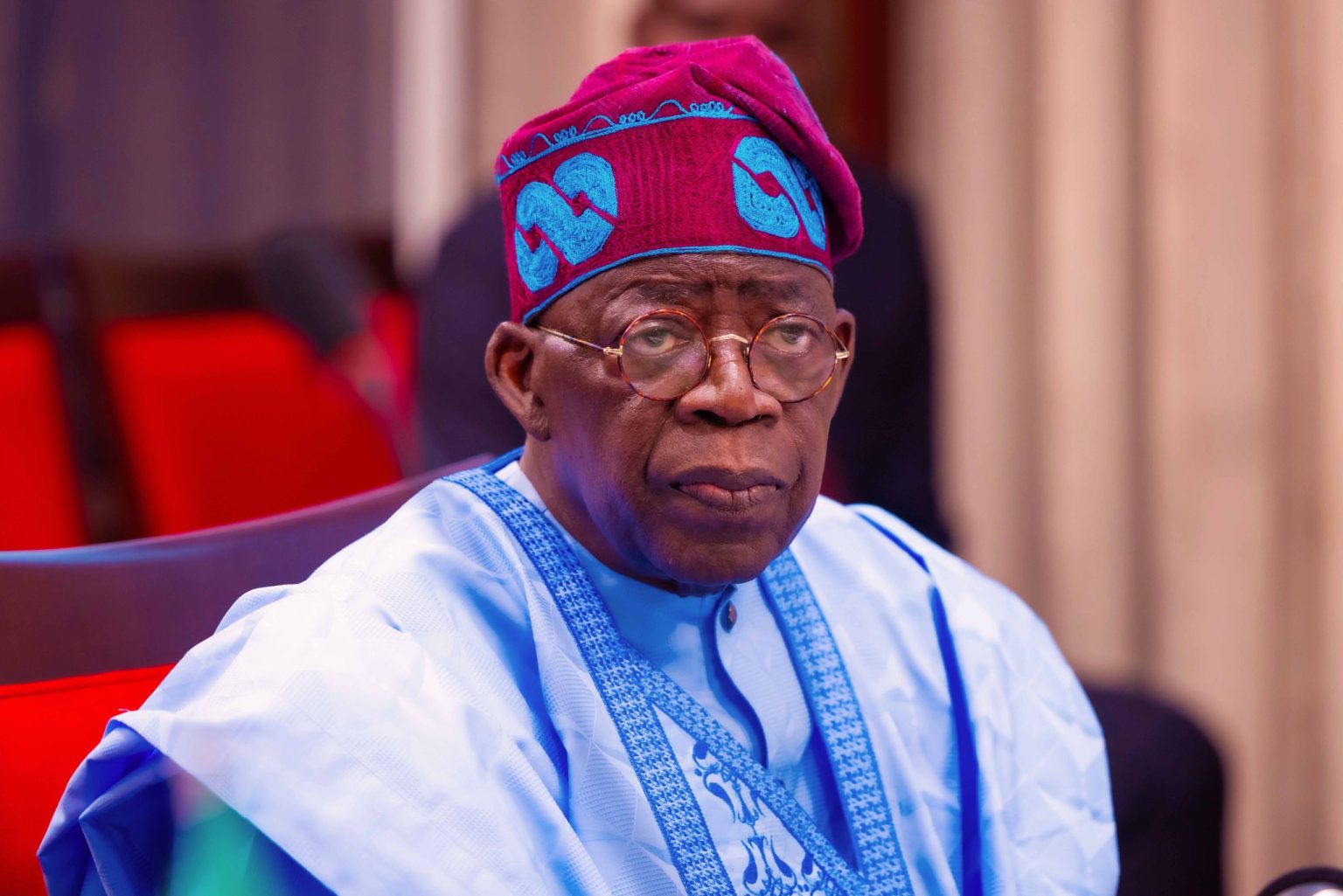
Enhancing Nigeria’s infrastructure through Public-Private Partnerships (PPPs) is a key focus of President Bola Tinubu’s Renewed Hope Agenda.PPP is a collaboration between a government agency and a private-sector company to finance, build, and operate public infrastructure projectsThe conceptualisation and implementation of PPPs involves managing both the public and private stakeholders to achieve the desired outcomes.
A 2022 World Bank analysis estimated that Nigeria would need to invest three trillion dollars by 2025 to close its infrastructure gap, as the current infrastructure stock is only 30 per cent of the Gross Domestic Product(GDP)That was far below the international benchmark of 70 per cent. In the last two years of Tinubu’s administration, there has been a focus on infrastructure development in areas like transportation, healthcare, energy, ICT, and urban renewal.Tinubu reaffirmed his administration’s commitment to Public-Private Partnerships (PPP) during the 29th Nigerian Economic Summit in 2023, emphasising the vital role these collaborations play in driving the nation’s growth and development.“We must work together. I have proven capacity in this regard, as we remember the role of public-private partnerships in the transformation of Lagos State under my leadership.“We will replicate that across Nigeria with your unwavering support,” the president said.The Federal Government, through the Infrastructure Concession Regulatory Commission (ICRC), has made substantial strides in infrastructure development in the last two years.The Lekki Deep Sea Port, the deepest port in West Africa, is now operational, unlocking trade efficiencies, attracting foreign direct investment, and creating over 170,000 direct and indirect jobs.The Lagos-Ota-Abeokuta and Abuja-Lokoja highways are now under viable PPP arrangements.The projects include smart tolling, safety systems, and modern rest facilities, as well as improved freight logistics on the Lagos-Ibadan rail corridor, which is reducing logistics costs by over 35 per cent and easing pressure on road networks.On road infrastructure, the ongoing six-lane 700-kilometre Lagos-Calabar coastal road is designed to enhance connectivity and facilitate trade across eight states: Lagos, Ogun, Ondo, Delta, Bayelsa, Rivers, Akwa Ibom, and Cross River.Also, the Sokoto-Badagry highway links the Western and Northern parts of the country.The Keffi-Akwanga-Lafia-Makurdi highway has been commissioned and is operational, while the Benin-Asaba highway has been commissioned under the Highway Development and Management Initiative (HDMI).The Federal Executive Council (FEC) has approved some projects, which include the Kashimbila Integrated Cargo/Agro-Allied Airport project in Taraba.Dr Jobson Ewelafor, Director-General, ICRC, said that the project entailed the upgrade of an existing airstrip in Kashimbila into a modern cargo and agro-allied airport, while also integrating over 3,000 hectares of farmland, fish farming facilities, and a ranch for livestock production.“Implemented under a PPP arrangement, this project is expected to generate over N4.1 trillion in revenue from multiple sources throughout the concession period, while enhancing Nigeria’s agricultural value chain and regional connectivity,” he said.The FEC also approved several PPP projects during its meeting on May 12, including the MediPool Initiative, which aims to reduce medicine costs and expand access to essential healthcare products nationwide, particularly in underserved areas.Ewelafor said that the initiative would centralise the procurement and delivery of medicines, vaccines, and consumables across Nigeria.According to him, PPPs are driving infrastructure delivery across all sectors, ensuring that no Nigerian is left behind.“Imagine a Nigeria where no child dies due to the unavailability of vaccines, where every health facility, no matter how remote, has access to life-saving drugs.“MEDIPOOL is just the beginning under President Bola Tinubu’s Renewed Hope Agenda,” ge said.FEC also approved the Ikere Gorge Hydropower Project in Oyo, which was originally initiated under the Obasanjo military regime, to generate a 6MW small hydroelectric power project, developed through PPP.The D-G said that the dam would be redeveloped under a Finance-Build-Operate-Transfer (FBOT) which will also provide potable water to towns like Iseyin and Saki, and irrigate thousands of hectares of farmlands.Also approved was the Federal Coastal Fishery Terminal Borokiri in Rivers, which will boost Nigeria’s fishery value chain through modern cold-chain logistics, job creation, and enhanced export capability.Other projects approved by FEC under Tinubu’s administration include the NIMASA maritime electronic management system, the Ministry of Interior Optimisation project (E-Verification Gates), and the Guards Management System.As part of ongoing reforms to strengthen Nigeria’s PPP ecosystem, the ICRC has fast-tracked the streamlining of the PPP Project Delivery Framework, enhancing both the speed and bankability of project execution.These projects have shown President Tinubu’s commitment to sustained infrastructure development in the country aimed at bridging the infrastructure gap.Ewalefoh assured that the ICRC would continue to provide regulatory oversight to ensure project transparency, value for money, and full alignment with global PPP standards.Some stakeholders, however, posit that above feats are yet to translate to visible infrastructure upgrade across the country.As the Tinubu-led administration crosses its halfway mark kn May 29, Nigerians remain hopeful of faster development kf modern infrastructure for a more comfortable existence.(NAN



